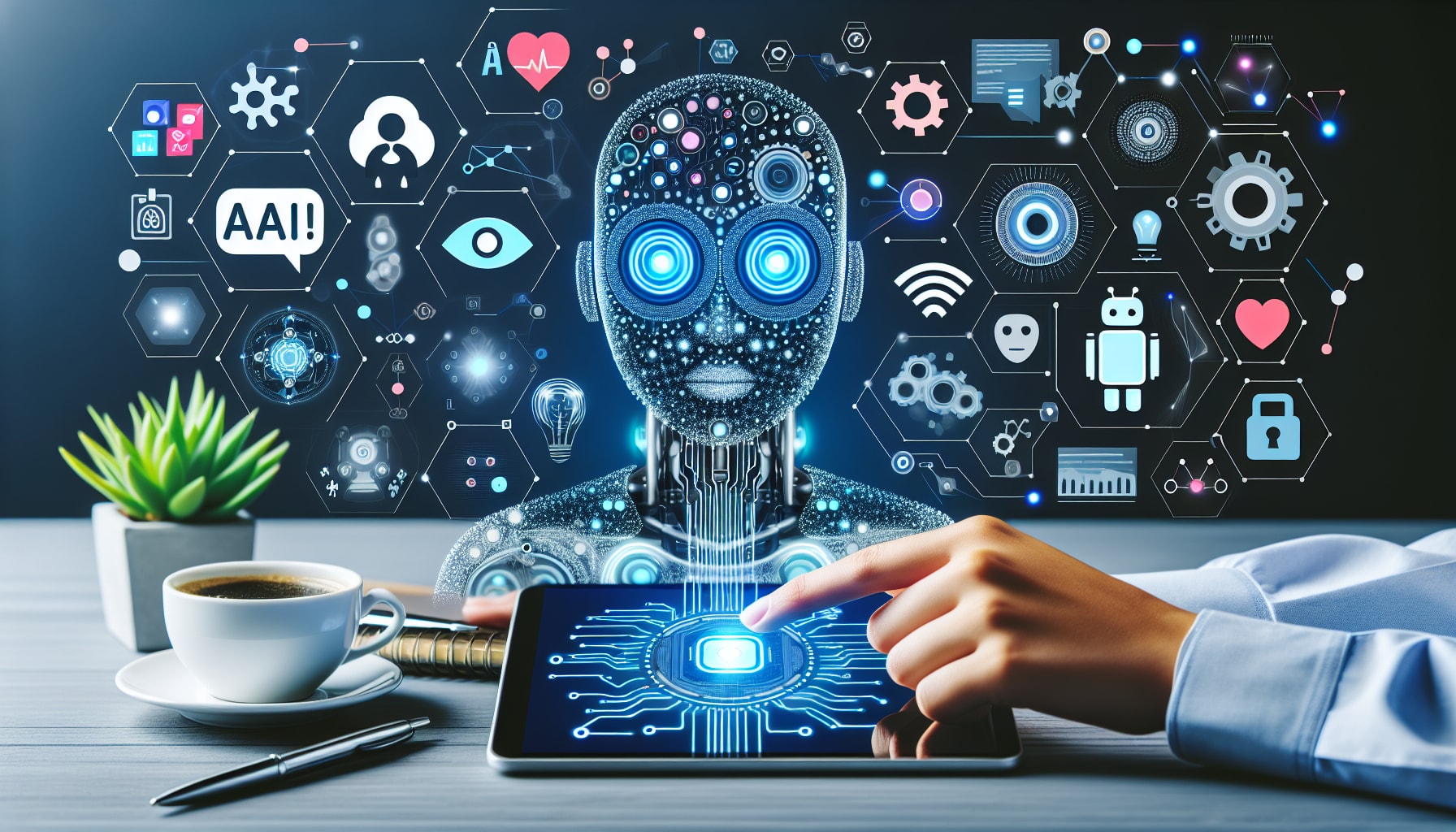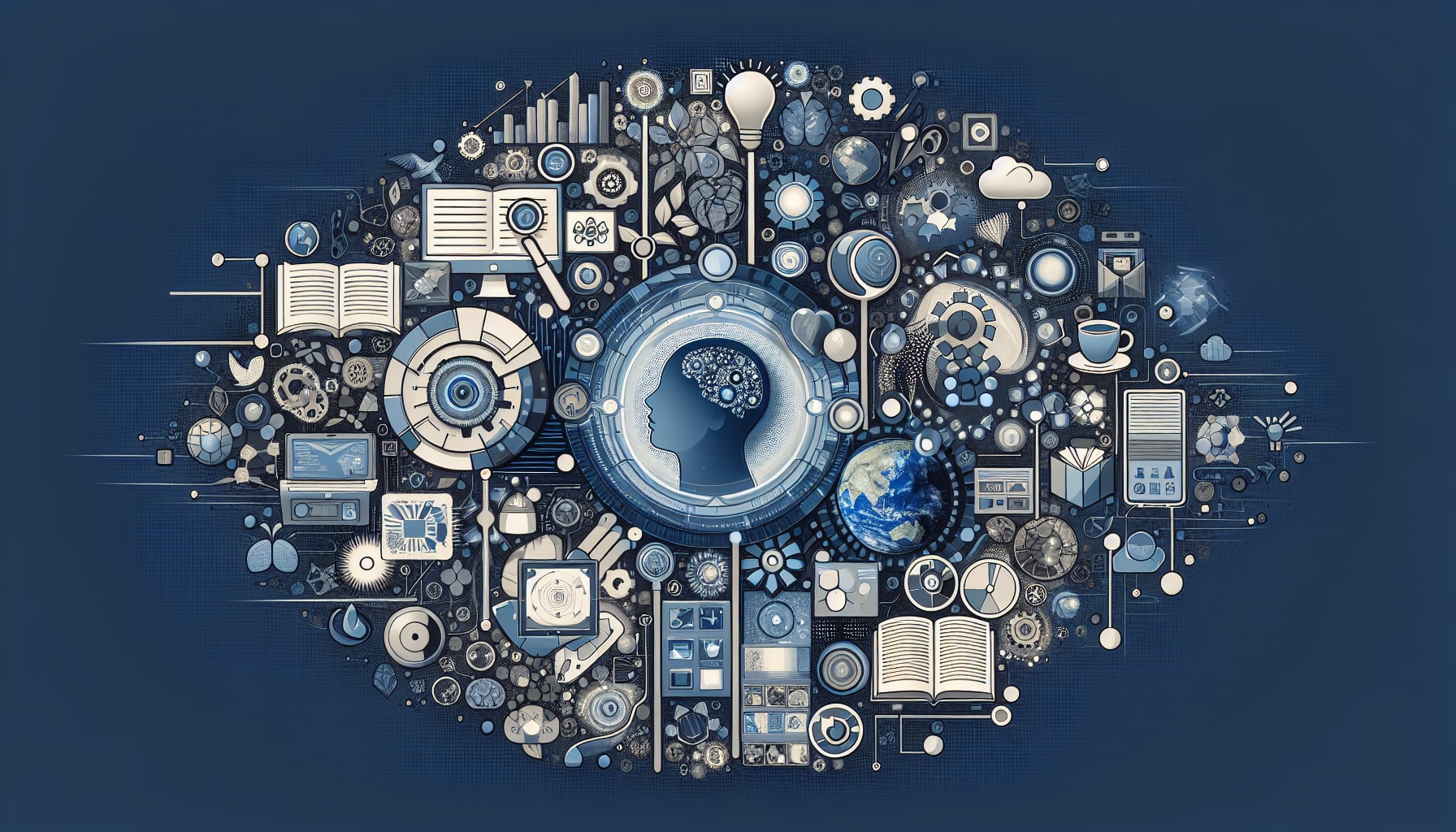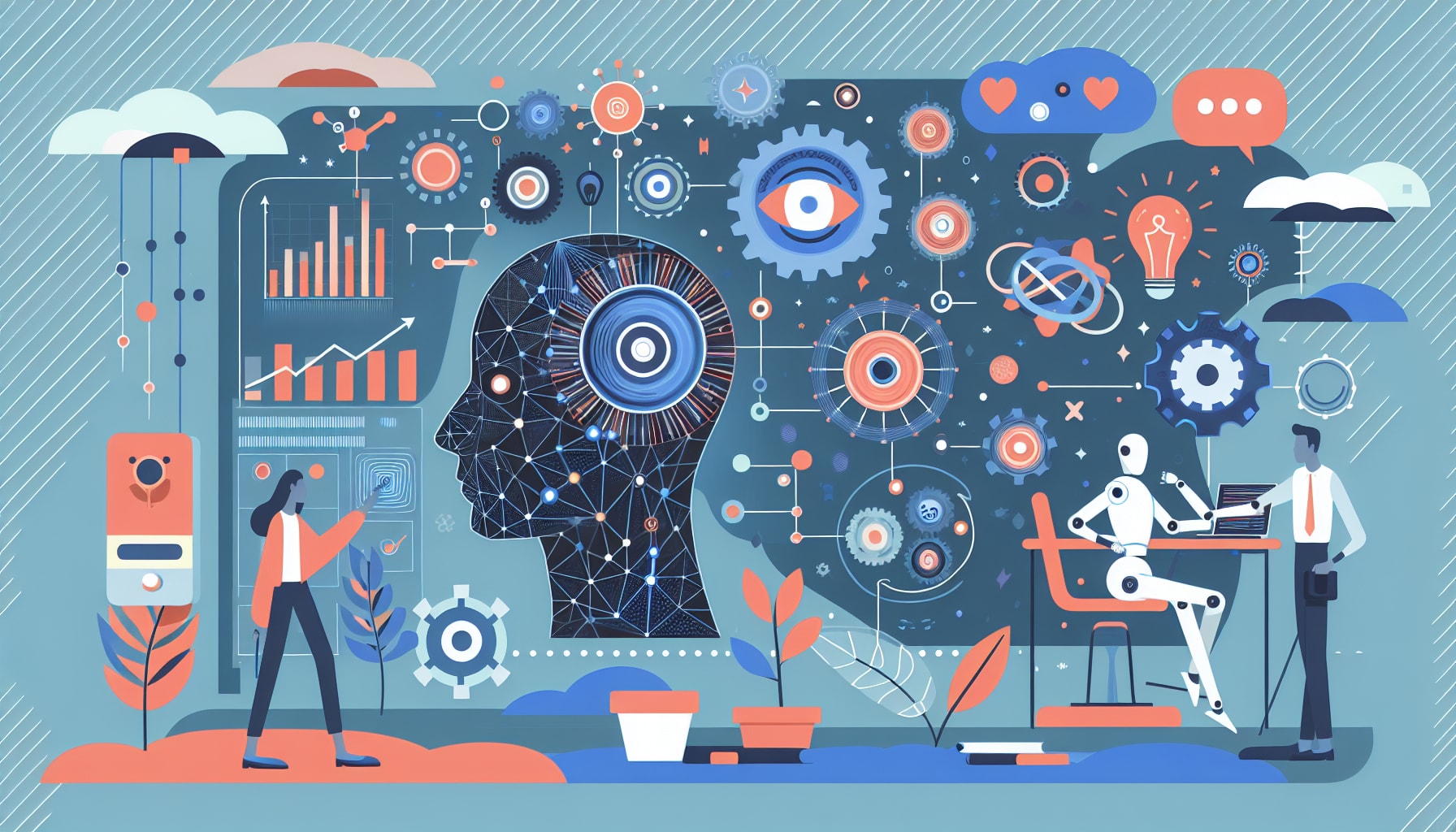

How is GenAI Transforming Content Creation: A Revolution in Creativity and Efficiency
Published on February 18, 2024
By Maria Del Carpio . 10 minute read
Generative AI (GenAI) is revolutionizing content creation by generating text, images, videos, and audio using advanced machine learning. Tools like ChatGPT and Gemini allow creators to produce content quickly and efficiently, enhancing creativity and productivity. In recent times, GenAI has become a buzzword across various sectors, businesses, and environments, showcasing its widespread influence. At Kreante, we stay updated on these trends and continuously train ourselves to harness the power of GenAI effectively. In this article, we’ll explore what GenAI is, its key components, and how it’s transforming content creation.
What is Generative AI (GenAI)?
Generative AI is a branch of artificial intelligence focused on creating new content by analyzing data patterns and predicting subsequent elements. This technology encompasses a variety of formats, including written, visual, video, and audio content, all produced through machine learning tools using human prompts. The transformative power of Generative AI is evident across various sectors, revolutionizing communication, work, and innovation. Examples of tools that harness this power include ChatGPT, Gemini, and ClaudeAI, which are widely used in content production.
The impact of Generative AI is profound, as it enhances both creativity and productivity. By automating the creation process, AI frees up human creators to focus on more complex and strategic tasks. This not only speeds up content development but also opens new avenues for innovation.
Understanding the key components reveals why GenAI is so effective.

Key Components of GenAI
The backbone of Generative AI lies in advanced models and algorithms that drive its capabilities. One of the most significant advancements in this field is the emergence of transformer-based deep neural networks, particularly large language models (LLMs). These models have shown capabilities that match or even exceed human performance on complex tasks since the early 2020s. By 2023, LLMs demonstrated their prowess in generating coherent and contextually relevant content, highlighting the leaps in AI technology, including natural language processing.
Foundation models, especially LLMs, are crucial for producing high-quality written content. These models have been trained on vast datasets, enabling them to generate text that is both meaningful and engaging. Recent advancements also include generative adversarial networks (GANs) and retrieval-augmented generation (RAG), which enhance the accuracy and quality of AI outputs. The trend towards smaller language models is noteworthy as they offer cost-effectiveness and ease of management while focusing on specialized tasks with less data.
Moreover, AI agents that perform tasks autonomously, such as writing or research, are becoming increasingly prevalent. These agents leverage the power of AI to execute specific functions, thereby improving efficiency and productivity. With these components in place, Generative AI is well-equipped to transform the landscape of content creation.
Applications of GenAI in Content Creation

Generative AI offers a plethora of applications in content creation, ranging from text and images to video and audio. This technology enables content creators to produce high-quality, engaging material quickly and efficiently. AI allows creators to adapt existing content into various formats for different platforms and audiences.
GenAI’s specific applications in text, image, and video/audio generation are explored below.
Text Generation
Text generation is one of the most prominent applications of Generative AI. Large Language Models (LLMs) are at the heart of this process, capable of processing and generating human-like text. AI tools like ChatGPT can quickly produce drafts, making it easier for human editors to refine the content, thereby enhancing productivity.
Generative AI’s ability to suggest topics and provide insights into search intent, efficiency scores, and traffic information is invaluable for content marketers. These insights help marketers create content that resonates with their audience, boosting engagement and conversion rates. AI tools can also suggest ideal headers or generate full paragraphs from a single prompt, streamlining the writing process.
Potential pitfalls should be considered. AI-generated content can sometimes lead to misinformation or plagiarism, given that it draws from vast datasets of existing content. Human oversight is vital to maintain content accuracy and originality.
Image Generation
Image generation through Generative AI is revolutionizing the way visual content is created. By analyzing data patterns, AI can generate new images that enhance creativity within marketing organizations. Tools like DALL·E 2 empower users to create realistic images and art from a description in natural language.
Generative AI serves as a collaborator for brand and content teams, facilitating the creation of visually appealing content that aligns with brand aesthetics. Collaborating with AI boosts productivity and fosters innovative visual expression. The ability to generate high-quality images rapidly is a game-changer in the content creation landscape.
Video and Audio Generation
The realm of video and audio generation is another area where Generative AI is making significant strides. AI generates video frames using Generative Adversarial Networks (GANs) and video diffusion models, enabling the creation of compelling video content. Video generation has applications in multiple areas. These include entertainment, sports analysis, and autonomous driving.
Platforms like DeepBrain and Synthesia utilize video and speech generation technologies to produce high-quality video and audio content. Text-to-speech conversion is another notable application, powered by transformers to generate natural-sounding speech. For example, these technologies can create engaging presentations.
These advancements are transforming how video and audio content is created and consumed by content consumers, offering new possibilities for content creators.
Benefits of Using GenAI in Content Marketing

The benefits of using Generative AI in content marketing are manifold. AI-generated content is typically more cost-effective than hiring human writers, designers, or editors, as AI tools can be free or have low monthly costs. Additionally, AI accelerates content development, improves scalability, and allows marketers to focus on more complex projects.
With more than 75% of marketers admitting to using AI tools, the impact of GenAI on content marketing is undeniable.
Enhancing SEO
Generative AI plays a crucial role in enhancing SEO. By synthesizing large data sets, AI helps marketers identify trends and insights more efficiently, expediting the content creation process. Tools like Surfer SEO integrate with content creation platforms to assist writers in optimizing their content for better search engine rankings. These tools provide data-driven insights and recommendations for improving SEO, readability, and tone of voice.
The ability to tailor content for various platforms while maintaining brand compliance is another advantage of using GenAI for SEO. AI generators can offer helpful suggestions for improving content, ensuring it meets the standards for search engine optimization and enhances overall visibility.
Personalization
Personalization is a critical component of effective content marketing, and Generative AI excels in this area. By reviewing content drafts and providing feedback on their relevance to a target audience, AI ensures that the content resonates with users. Tailoring content specifically for audience preferences increases the likelihood of effective communication and interaction, leading to improved performance in marketing strategies.
Brands that excel in personalization are more likely to report enhanced customer loyalty. Consumers increasingly expect personalized content, with many stating that it significantly influences their purchasing decisions. By leveraging AI for personalized content, marketers can enhance user engagement, satisfaction, and overall customer experience.
Challenges and Ethical Considerations

While Generative AI offers numerous benefits, it also presents several challenges and ethical considerations. Maintaining the accuracy and originality of AI-generated content is crucial since it often relies on existing datasets. Intellectual property rights violations and the potential for AI-generated misinformation are other critical issues.
Quality control and legal and ethical concerns are detailed in the following subsections.
Quality Control
Quality control is paramount when using Generative AI for content creation. AI-generated content can include mistakes and biases, compromising its quality. Human oversight is crucial in reviewing AI-generated content to ensure accuracy and mitigate biases. AI content detection tools can analyze text and display confidence levels regarding whether it was created by AI, helping to maintain high standards of originality and creativity.
Even with advanced AI capabilities, limited creativity and originality remain challenges. Therefore, incorporating human creativity and judgment in the content creation process is essential to uphold the quality, knowledge, and authenticity of the final output.
Legal and Ethical Concerns
Legal and ethical concerns are integral to the discussion of Generative AI. AI models require extensive data for training, raising issues about privacy and personal data handling. The unclear origins of data used by generative AI tools can pose significant risks related to copyright and intellectual property. Ensuring AI-generated content aligns with ethical standards requires human intervention to mitigate harmful or misleading outputs.
Transparency in AI decision-making processes is essential to identify and correct biases effectively. Human involvement is crucial in monitoring AI performance to catch any potential errors or biases, ensuring that the content generated is both ethical and accurate.
Best Practices for Implementing GenAI

Implementing Generative AI effectively requires adherence to certain best practices. From defining clear objectives to validating AI-generated content, these practices ensure successful outcomes and high-quality results.
Key best practices for leveraging GenAI in content creation are outlined below.
Defining Goals
Set clear objectives to integrate GenAI effectively into content workflows. Measurable targets help track improvements in efficiency and engagement, aligning AI initiatives with business strategy.
Double-Checking Outputs
Validate AI-generated content for accuracy and relevance before publication. Regular reviews ensure content meets quality benchmarks and maintains high standards.
Maintaining Human Oversight
Human oversight is crucial to ensure the quality and creativity of AI outputs. Editors should correct errors and biases, preserving originality and authenticity.
Leveraging Personalization
Use GenAI to tailor content for your audience. AI tools analyze user data to create personalized content, enhancing engagement across platforms.
Optimizing for SEO
Employ GenAI tools for SEO insights. AI analyzes data to suggest improvements, helping content rank higher and driving more site traffic.
Ensuring Ethical Use
Adopt ethical guidelines when using GenAI to prevent the misuse of AI-generated content. This includes ensuring transparency in AI processes and addressing any potential biases.
Continuous Learning and Adaptation
Stay updated with the latest GenAI advancements and continuously adapt your strategies. This helps to maximize the benefits of new technologies and maintain a competitive edge.
Fostering Collaboration
Encourage collaboration between AI and human teams to blend technological capabilities with human creativity. This synergy can lead to innovative solutions and improved content quality.
By following these best practices, businesses can effectively harness the power of GenAI to enhance their content creation strategies, engage their audience, and stay ahead in the digital landscape.
The Synergy of Generative AI and NoCode
Generative AI (GenAI) and NoCode technologies are revolutionizing content creation by offering unprecedented opportunities for creativity and efficiency, without the need for extensive technical skills. GenAI excels in generating text, images, video, and audio, transforming how content is created and consumed. When paired with NoCode platforms, these technologies empower creators to develop sophisticated digital solutions rapidly.
The combination of GenAI and NoCode enables users to automate content creation processes, streamline workflows, and enhance productivity. This synergy allows for the creation of dynamic and interactive content, tailored to diverse audiences, without requiring traditional coding expertise. The benefits of using these technologies include cost savings, improved scalability, and enhanced personalization.
However, the integration of GenAI and NoCode also presents challenges and ethical considerations that must be addressed to ensure the quality and integrity of AI-generated content. By adhering to best practices and leveraging the right tools, businesses can harness the power of these technologies to enhance their content marketing strategies and stay ahead in an increasingly competitive digital world.
Do you want to explore more about AI and NoCode? Feel free to read our dedicated blog.
Frequently Asked Questions
What are some benefits of using AI in content marketing?
Using AI in content marketing enhances efficiency in content production, increases scalability, and helps reduce overall costs. These benefits enable businesses to create more effective marketing strategies while optimizing their resources.
How can AI help optimize content for search engines?
AI can enhance content optimization for search engines by analyzing text and offering tailored recommendations to improve SEO, readability, and tone of voice. By leveraging these insights, you can create more effective and engaging content.
What are some challenges associated with AI in content marketing?
AI in content marketing faces challenges such as lack of accuracy, risk of plagiarism, and the inability to convey the human touch or appropriate tone. These issues can hinder the effectiveness of marketing strategies and audience engagement.




Wondering how NoCode/LowCode can revolutionize your project?








